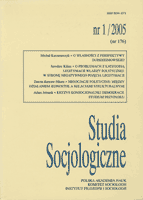Kryzys konsocjonalnej demokracji. Studium przypadku
Crisis of the Consociational Democracy. The Case Study
Author(s): Adam JelonekSubject(s): Social Sciences
Published by: Instytut Filozofii i Socjologii Polskiej Akademii Nauk
Keywords: consociational democracy; consociationalism; Lijphart; political system; Malaysia
Summary/Abstract: Based on empirical observations and theoretical assumptions Arendt Lijphart introduces the consensus and then consociational model of democracy. The argument for consociationalism is grounded in the assumption that democracy and majority rule might be found incompatible. The important fundamental assumption of Lijphart is that in the so called plural societies (deeply divided along racial, ethnic, religious or cultural lines), the stakes of politics are usually much higher than in homogenous societies. The consequent assumption is that political leaders of all significant segments of the plural society cooperate in a grand coalition to govern the country. Although such political behavior was recommended by Lijphart to the all plural societies as the optimal one, in the most cases the attempt to create the consociational model of democracy has appeared to be a total failure. In this paper the author tries to analyze one of such cases: of multi-ethnic and multi-racial Malaysia.
Journal: Studia Socjologiczne
- Issue Year: 176/2005
- Issue No: 1
- Page Range: 93-116
- Page Count: 23
- Language: Polish

